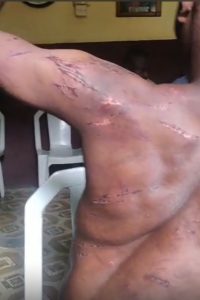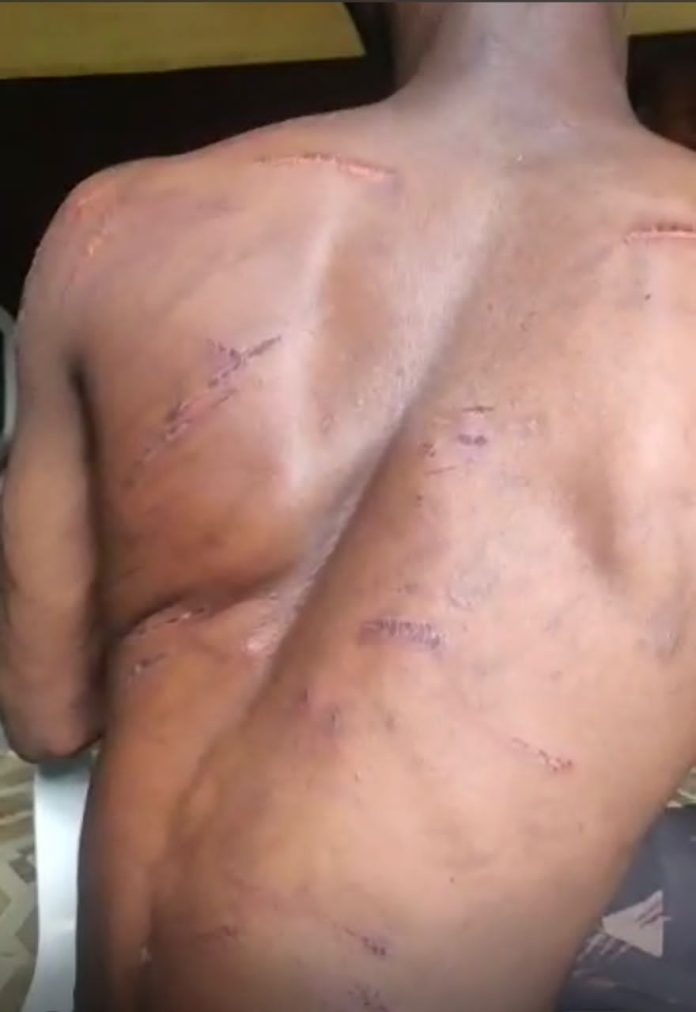By Chisom Oguadimma
In early August, the Taskforce of the Oke-Arin Traders Association in Lagos State rescued John Onwuanyiam, a 19-year-old apprentice from Otta Village, Oraukwu, Idemili North Local Government, Anambra State. John had been enduring abuse while working for his master, a bakery item seller at the Oke-Arin market. The Task Force intervened after John’s master was caught harassing, maltreating, and physically abusing him.
This incident has raised concerns about the exploitation and mistreatment of apprentices, particularly under the “boyi-boyi” system in Nigeria. This system often leaves young boys vulnerable to abuse. In this report, John shares his harrowing experience after being rescued and returned to his family.
How It All Started
John began his apprenticeship in 2020 with his family’s consent, agreeing to serve his master for six years. However, events in August 2024 changed everything.
One day, John’s master accused him of stealing ₦20,000. Despite John’s denial, the master tortured him using wires and bottles. “He kept beating me with a wire, demanding I confess where the money was, but I didn’t take it,” John recalled.
The abuse continued at their shop and later at home. A concerned neighbor noticed John outside one night and asked what was wrong. After hearing about the abuse, the neighbor confronted the master, who promised to stop but resumed the beatings that night, leaving John bleeding and wounded.
The following morning, John’s master continued to beat him at the shop. Nearby traders noticed what was happening and intervened after the master left. They approached John, offering to help him return to his family.
“When my master returned, they confronted him and demanded he follow them to their office. He thought they were joking until they forcefully ordered him to comply,” John explained. The Task Force then rescued John and took him away from the abusive situation.
The Boy Child Matters Too
John’s case highlights the dangers of the “boyi-boyi” system, where young boys are sent to work far from home, often without any support. These apprentices are vulnerable to exploitation, and many suffer in silence, unable to seek help.
It is crucial for laws and regulations to protect apprentices from abuse. Harsh working conditions and maltreatment during apprenticeships should be criminalised, with violators facing legal consequences.
Many cases like John’s go unreported, but it is vital that systems are put in place to ensure the safety of these boys. Government agencies should monitor the treatment of apprentices and provide safe spaces where they can report abuse.
Not Just About Money
John revealed that the abuse wasn’t only about money. The master’s wife was aware of the situation but did nothing. John was forced to eat only once a day and was burdened with additional chores, including cooking, cleaning, and washing clothes for the master’s family.
“The wife had urged her husband to return me to my parents, but he refused,” John said. He explained that he had no friends and spent all his time either at the shop or attending Sunday services with the family.
Stereotyping and Continued Abuse
John believes the abuse was partly due to a common stereotype that apprentices steal from their masters. “Even though I told him I didn’t take the money, he didn’t believe me,” he said.
According to other shop owners, John’s master had mistreated three previous apprentices, who all left after experiencing similar abuse.
John also recounted how, after two years with the master, he stopped receiving three meals a day. “I would go to the shop hungry, stay hungry all day, and only eat when we returned home,” he said. One day, John took ₦3,000 to buy food while his master was away because he could no longer bear the hunger.
In the Eyes of the Law
After the Task Force’s intervention, the chairman of the Oke-Arin market insisted that John’s master take responsibility for his actions and return John to his family. Although the master apologized and promised to treat John better, the chairman ensured that John was safely returned to Oraukwu.
The chairman also ordered the master to compensate John for the four years he served. The Oke-Arin Traders Association is monitoring the situation to ensure the master fulfills this obligation.
John’s parents expressed gratitude to the Task Force for rescuing their son. “If not for them, we wouldn’t have known what was happening,” his mother said. “My son is not one to speak up, but we are thankful he is alive to tell his story.”




